|
|
|
Sort Order |
|
|
|
Items / Page
|
|
|
|
|
|
|
| Srl | Item |
| 1 |
ID:
168215
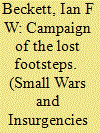

|
|
|
|
|
| Summary/Abstract |
What Rudyard Kipling called the ‘campaign of lost footsteps’ was the longest campaign fought by the Victorian army. The conquest of Upper Burma, an area of 140,000 sq. miles with a population of four million, took only three weeks in November 1885 and was accomplished with minimum cost. However, the removal and deportation of the Burmese King and dismantling of all traditional authority dismantled led to growing resistance to British rule leading to an increasingly difficult guerrilla war. Though the Burmese guerrillas were characterised by the British as mere bandits or dacoits, many were former soldiers along with Buddhist monks. The extremely difficult nature of campaigning in the terrain and climate of Burma was not sufficiently appreciated by the War Office, who viewed the conflict as a ‘subaltern’s war’ and ‘police’ work. Intended regime change was also not accompanied by any consideration of the likely implications. Prolonged insurgency necessitated deploying a force far larger than originally intended; though order was finally secured by 1895, the campaign proved destructive of Burmese society while British recruitment of hill tribes into the police and armed forces sowed the seeds for future divisions.
|
|
|
|
|
|
|
|
|
|
|
|
|
|
|
|
| 2 |
ID:
168212
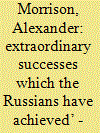

|
|
|
|
|
| Summary/Abstract |
Charles Callwell’s Small Wars (1896, 1899, 1906) is widely considered both an ur-text for modern counter-insurgency studies, and a primer for the racialized late-Victorian approach to war against ‘savages’: either way it is usually only considered within a British context. Alongside the numerous examples Callwell used from British colonial campaigns, he frequently referred to those of other European powers – notably the Russian conquest of Central Asia. This article will seek to analyse Callwell’s views of Russian colonial warfare, establish the sources on which he relied, and evaluate his accuracy and the effect which the Russian example had on his thinking.
|
|
|
|
|
|
|
|
|
|
|
|
|
|
|
|
| 3 |
ID:
168207
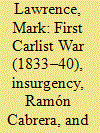

|
|
|
|
|
| Summary/Abstract |
The period 1833 to 1840 witnessed a brutal civil war in Spain waged between insurgent Carlists and the government Cristinos. The Carlists managed to secure reliable territorial control only over one part of Spain (upland Navarra and rural parts of the neighbouring Basque provinces). Although pockets of armed Carlism flourished elsewhere in Spain, especially in Catalonia, Aragón and Galicia, these insurgents were ineffective at coordinating actions. The Carlist court in the Basque country tried to break its strategic blockade by launching a series of expeditions into Cristino-held territory in the hope of destabilising the Madrid regime and consolidating distant insurrections. This article explains how and why these expeditions scored tactical victories but strategic failures. In particular it argues that Carlist raiding strategy was a failure, for its use of violence against real and imagined enemies in marginal and Cristino areas of control alienated civilian support.
|
|
|
|
|
|
|
|
|
|
|
|
|
|
|
|
| 4 |
ID:
168216
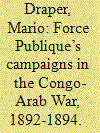

|
|
|
|
|
| Summary/Abstract |
Between 1892 and 1894 the Force Publique of King Leopold II’s Congo Free State engaged in a series of little-known counter-insurgency operations against ivory and slave traders from Zanzibar, commonly referred to as Arabs. Without a particularly strong tradition of imperial service, this article argues that the predominantly Belgian officer corps borrowed and adapted methods used by more experienced colonial forces in the 19th Century. Whether taken from existing literature or learned through experience, it reveals that the Force Publique’s counter-insurgency methods reflected many of the more recognisable aspects of traditional French and British approaches. It suggests that, despite the unique nature of each colonial campaign, basic principles could be adapted by whomsoever to overcome the military and political challenges of colonial conquest. The Force Publique’s campaigns in the Congo-Arab War, therefore, provide further evidence as to how some base theories could be universally applied.
|
|
|
|
|
|
|
|
|
|
|
|
|
|
|
|
| 5 |
ID:
168213


|
|
|
|
|
| Summary/Abstract |
This paper examines the career of one of the most notable of Chinese state officials in the mid-nineteenth century, General Zuo Zongtang (1812–1885) at a time when the Qing Empire was beset by enemies on all sides along with the massive Taiping Rebellion (1851–65). The paper explores how Zuo created a coherent and flexible counter-insurgency doctrine that underpinned his suppression of the Taipings, the Nian, Muslim rebels of the northwest and the defeat of a massive Sufi revolt in Central Asia. The paper also shows how Zuo helped convince the Russians to return territory they occupied in Central Asia, thereby preserving the territorial integrity of the Qing Empire in the region.
|
|
|
|
|
|
|
|
|
|
|
|
|
|
|
|
| 6 |
ID:
168210
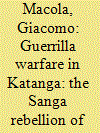

|
|
|
|
|
| Summary/Abstract |
This article discusses the origins and development of the Sanga insurgency of the 1890s with a view to demonstrating that, contrary to commonly held stereotypes, pre-colonial warfare was neither simple nor unchanging. Its tactics, it is argued here, repay the sort of close analysis commonly reserved for other typologies and theatres of war. The Yeke, against whose exploitative system of rule the Sanga and their allies rose up in 1891, survived the onslaught by entering into a strategic alliance with Lofoi, a newly established station of the Congo Free State, and its limited contingent of regular Force Publique troops. An in-depth examination of the joint Yeke-Force Publique counterinsurgency campaign leads to the conclusion that the novelty of the ‘small wars’ that accompanied the Scramble for Africa should not be overstated. In southern Katanga and, by implication, elsewhere, these confrontations were shaped by processes of mutual borrowing in which African military practices and even political aims were not necessarily subordinate to European ones.
|
|
|
|
|
|
|
|
|
|
|
|
|
|
|
|
| 7 |
ID:
168208


|
|
|
|
|
| Summary/Abstract |
In his seminal study of the changing nature of warfare between Agincourt and the Somme, military historian John Keegan proposed that future historians might consider combatants’ emotions in their assessments of the impact and nature of conflict. Recent years have witnessed the emergence of the history of emotions as an analytical approach, but rarely, if ever, is this directed toward the study of military history, far less the history of insurgencies and counter-insurgencies. This paper examines America’s civil war (1861–1865) as a case study of the ways in which an emotional history approach might illuminate not the physical experiences of but rather the immediate and longer-term reactions to counter-insurgency conflict through a focus on one specific individual, the future Supreme Court Justice Oliver Wendell Holmes, Jr. It proposes that Holmes, whilst not a man of the ranks, nevertheless can reveal the wider ramifications of civil war and its emotional impact, both individually and culturally. As a relatively limited internecine war, one not fought by professional armies but by volunteer forces, America’s civil war highlights the ways in which the soldier’s response points us toward the kind of emotional revolution that has, to date, mainly been located within the European nations.
|
|
|
|
|
|
|
|
|
|
|
|
|
|
|
|
| 8 |
ID:
168211


|
|
|
|
|
| Summary/Abstract |
The period 1848 to 1867 witnessed what could be regarded as a very small-scale insurgency campaign in Ireland, waged by agrarian groups; the Whiteboys and Ribbonmen. 1848 and 1867 witnessed rebellions by the Young Irelanders and Fenians, which proved to be small-scale and of short duration but the British government had prepared for a nationwide counter-insurgency campaign. The government relied heavily on the militarised Irish Constabulary but in 1848 and 1867 troops were used in large numbers and there were concerns about how they could be best concentrated to meet the envisaged threat.
|
|
|
|
|
|
|
|
|
|
|
|
|
|
|
|
| 9 |
ID:
168209
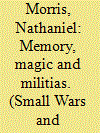

|
|
|
|
|
| Summary/Abstract |
Mexico’s Cora Indians have played an outsized role in national history, thanks to their skilful use of guerrilla tactics and success in forging strategic alliances with outside forces in defence of their cultural, territorial and political autonomy. Cora participation in elite struggles between Liberals and Conservatives (1850–73), and subsequently in the Mexican Revolution (1910–20), helped to shape the way that both conflicts played out in Western Mexico. Such participation also allowed Cora communities to keep hold of traditional landholdings in the face of political and economic reform, while sowing the seeds for the foundation of the Mexican state of Nayarit.
|
|
|
|
|
|
|
|
|
|
|
|
|
|
|
|
| 10 |
ID:
168204


|
|
|
|
|
| Summary/Abstract |
The brief war that took place between Spain and Portugal in 1762 is one of the least known episodes in the latter’s military history, whereas, thanks to Wellington’s construction of the Lines of Torres Vedras, the French invasion of 1810–11 is right at the other end of the spectrum. Yet the two episodes are closely linked to one another. At the very least, they are uncannily reminiscent in terms of their details – in both cases substantial foreign armies were vanquished through a combination of irregular resistance, scorched-earth tactics and the clever use of field fortifications – and the article therefore argues that Wellington based the plan that defeated the forces of Marshal Massena on the strategy used by the Portuguese half a century earlier.
|
|
|
|
|
|
|
|
|
|
|
|
|
|
|
|
| 11 |
ID:
168214


|
|
|
|
|
| Summary/Abstract |
The German Sonderweg thesis has been discarded in most research fields. Yet in regards to the military, things differ: all conflicts before the Second World War are interpreted as prelude to the war of extermination between 1939–1945. This article specifically looks at the Franco-Prussian War 1870–71 and German behaviour vis-à-vis regular combatants, civilians and irregular guerrilla fighters, the so-called francs-tireurs. The author argues that the counter-measures were not exceptional for nineteenth century warfare and also shows how selective reading of the existing secondary literature has distorted our view on the war.
|
|
|
|
|
|
|
|
|
|
|
|
|
|
|
|
| 12 |
ID:
168206


|
|
|
|
|
| Summary/Abstract |
In the decades following independence from Spain, ‘civil wars’ ravaged the newly established polities in South America. Former vice-regal capitals inherited a larger portion of the colonial administration and had larger economic resources and a hegemonic project they were able to have permanent and professional armed forces, capable of leading the offensive and giving battle following the European rules of military art. The central hypothesis of this work is that there is a necessary relationship between the shape of these asymmetrical conflicts, their outcome and the political territorial configuration of each country in post-revolutionary Spanish America. When permanent armies took over from local militias, the capital kept the integrity of its territories and there was a tendency towards political centralization. When this did not happen and the militias managed to find a way to defeat their centralizing enemies, the local powers had an opportunity to renegotiate their participation in the political body, and sought to maintain their independence, which was manifest in federal agreements, otherwise a process of territorial fragmentation began. More than a difference between regular and irregular forces there was one between intermittent, and permanent mobilization.
|
|
|
|
|
|
|
|
|
|
|
|
|
|
|
|
| 13 |
ID:
168205


|
|
|
|
|
| Summary/Abstract |
At the turn of the nineteenth century, China’s Qing dynasty (1644–1912) was hit by a sectarian rebellion. Commonly considered a breakpoint marking the end of the dynasty’s golden age spanning most of the eighteenth century, the war to suppress the rebels, referred to as the White Lotus War (1796–1804) in this article (‘White Lotus’ was the umbrella name used by both the authorities and some sectarians for their teaching), exposed many structural drawbacks of the Qing political and military systems and depleted the dynasty’s financial resources, which had never been recovered. Reluctant in embracing guerrilla warfare in the beginning, the insurgents quickly turned themselves into master guerrillas. Shuttling in two massive mountain ranges in central China, they managed to prolong their rebellion and fought some successful battles against their suppressors. Superior in manpower, weaponry, and logistical support, the government forces had to adapt to guerrilla warfare, albeit passively and ineptly. This article gives a brief introduction to this little-known episode of guerrilla war at the turn of the nineteenth century in Qing China, expounds the strengths and weaknesses of both sides, and sheds light on the roots of the war’s long duration and the grim consequences to the Qing state.
|
|
|
|
|
|
|
|
|
|
|
|
|
|
|
|
| 14 |
ID:
168217
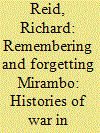

|
|
|
|
|
| Summary/Abstract |
While the study of organised violence is considered essential to understanding the history of the West, and accordingly imbued with various layers of meaning and remembrance, war is widely regarded as inimical to the modern nation in Africa and stable development more broadly. Using examples drawn from primarily from East Africa, this paper considers the ways in which warfare in the deeper (‘precolonial’) past has been framed and envisioned in recent decades, in particular by governments whose own roots lie in revolutionary armed struggle and who began life as guerrilla movements. While in some cases particular elements of the deeper past were indeed mobilised in pursuit of contemporary political goals, in many other scenarios histories of precolonial violence were beheld as problematic and unworthy of remembrance. This paper highlights the paradox and ambiguity which has attended the memory of key aspects of Africa’s deeper past.
|
|
|
|
|
|
|
|
|
|
|
|
|
|
|
|
| 15 |
ID:
168203


|
|
|
|
|
|
|
|